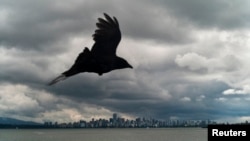More than 170 years after Edgar Allan Poe's fictional raven croaked, "Nevermore," scientists are reporting that real-life ravens think about the future.
In a series of tests, ravens showed signs of a general planning ability that previously had been documented only in people and great apes. Even monkeys have failed to show it.
It's not like you could ask a raven to arrange your wedding: Ravens showed they could plan by setting aside a tool that they suspected would get them a tasty treat later. And they prepared for future bartering, too.
Still, it's impressive. Ravens, along with crows, jays and others, belong to a bird group called corvids. Some corvids have shown that in hoarding food, they do some planning for the future instead of just acting on natural urges. But does such foresight appear only for that behavior, as has been proposed? Or can corvids, like people and great apes, apply it to other activities?
This more general planning ability results from the combination of several skills, and if it appears in both corvids and great apes, it must have evolved more than once, the Swedish researchers said.
The researchers, Can Kabadayi and Mathias Osvath of Lund University, tested five captive ravens in two tasks they don't do in the wild: using tools and bartering with humans. They reported the results in a paper released Thursday by the journal Science.
The birds were shown a box that had a tube sticking out of the top, plus three stones. They learned that they could use a stone as a tool. If they dropped it down the tube, the box would release a coveted doggie treat. They also learned that some other familiar objects, like a small wooden wheel and a ball, would not work.
Now the fun began.
In one experiment, the ravens were shown the box, but without any stones available. Then the box was taken away. An hour later, in another location, they were presented with a tray containing a stone plus three objects the birds knew would be useless for releasing the treat.
They were allowed to choose one thing from the tray. Fifteen minutes later, the box would show up again. Sure enough, in 14 cases of encountering the tray and later seeing the box reappear, they usually chose the stone and proceeded to use it correctly.
The same thing happened in another experiment, when the box didn't show up again until the next day, a delay of 17 hours.
Further work showed the ravens would pass up an immediate reward if they could get a better one by waiting a while.
Bartering
The ravens also showed they could barter for what they needed. The birds learned that they could exchange a blue plastic bottle cap with one of the experimenters for the favored doggie treat. When the experiments were repeated with the bottle cap replacing the stone, and an experimenter instead of the box, the results were basically the same.
The work presents "compelling evidence" of planning ability that goes beyond stashing food away, Markus Boeckle and Nicola Clayton of Cambridge University wrote in an accompanying commentary.
Although the evidence is new, the ability of ravens to see ahead has long been suspected: In Greek mythology, they are associated with the god of prophecy; an old term for a group of ravens is "conspiracy"; and in Game of Thrones, a three-eyed raven appears in a prince's prophetic visions.




